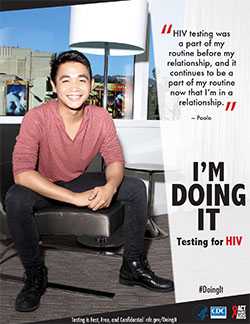Asian & Pacific Islanders HIV/AIDS Awareness Day

May 19 is National Asian & Pacific Islander HIV/AIDS Awareness Day. It is a day to break the silence about HIV and AIDS in Asian and Pacific Islander communities and encourage individuals to get tested for HIV.
Native Hawaiians and other Pacific Islanders (NHOPI) make up 0.2% of the U.S. population and account for a very small percentage of new HIV diagnoses in the United States—less than 1% in 2015, the majority of which were in gay and bisexual men (78% [62]). However, HIV affects NHOPI in ways that are not always apparent. Despite a 22% decline in HIV diagnoses from 2010-2014, NHOPI had the third-highest rate of HIV diagnoses (14.1 per 1 00,000 people) by race/ethnicity in the United States.
Asians make up 6% of the U.S. population and accounted for 2% (959) of the 40,040 new HIV diagnoses in this country and six dependent areas in 2015. Of Asians diagnosed with HIV in 2015, 86% were men and 14% were women; gay and bisexual men accounted for 89% of HIV diagnoses among all Asian men in 2015.

Doing It, CDC’s newest HIV testing campaign, features people sharing their stories about HIV testing in order to motivate all adults to get tested and know their status.

Everyone should know their HIV status. To find an HIV testing location near you, visit the GetTested Web site, or text your ZIP Code to KNOWIT (566948).
To raise awareness about the impact of HIV on these populations, National Asian and Pacific Islander HIV/AIDS Awareness Day is observed nationwide on May 19. This observance day was founded by the Banyan Tree Project, with support from the Centers for Disease Control and Prevention, to end the silence and shame surrounding HIV and AIDS in Asian and Pacific Islander communities, help prevent HIV, and help those who are living with this disease. True stories of courage and compassion about people in the community who are living with HIV and empowered themselves by sharing their experiences are available on the Banyan Tree website.
The Banyan Tree Project is sponsored by the San Francisco-based Asian & Pacific Islander Wellness Center, in collaboration with partner organizations in Boston, Chicago, Honolulu, Los Angeles, and Washington, D.C.
What Can You Do?
- Learn more about HIV among Asians and Native Hawaiians and other Pacific Islanders by reading CDC’s new fact sheets: HIV Among Asians in the United States, HIV Among Native Hawaiians and Other Pacific Islanders in the United States.
- Get tested for HIV. To find a testing location near you, visit the GetTested website, or text your ZIP Code to KNOWIT (566948).
- Talk with your healthcare provider about your risks for HIV.
- Get the facts about HIV and AIDS by visiting the Act Against AIDS website to learn about:
- The risk factors for acquiring HIV.
- How to avoid high-risk behaviors.
- How to practice safer methods to prevent HIV.
- Doing It , CDC’s newest HIV testing campaign, for testing locations and HIV information.
- How to talk about HIV prevention with family,friends, and colleagues.
- Let’s Stop HIV Together, which raises awareness about HIV and fights stigma.
- HIV Treatment Works, which encourages people living with HIV to stay in care.
- Volunteer at a local organization that serves people living with HIV.
- Stand up against stigma, racism, and other forms of discrimination associated with HIV and AIDS.
- Learn more from Asian and Pacific Islander health organizations, including:
- Page last reviewed: May 18, 2017
- Page last updated: May 18, 2017
- Content source:
- National Center for HIV/AIDS, Viral Hepatitis, STD, and TB Prevention (NCHHSTP), Division of HIV/AIDS (DHAP)
- Page maintained by: Office of the Associate Director for Communication, Digital Media Branch, Division of Public Affairs




 ShareCompartir
ShareCompartir